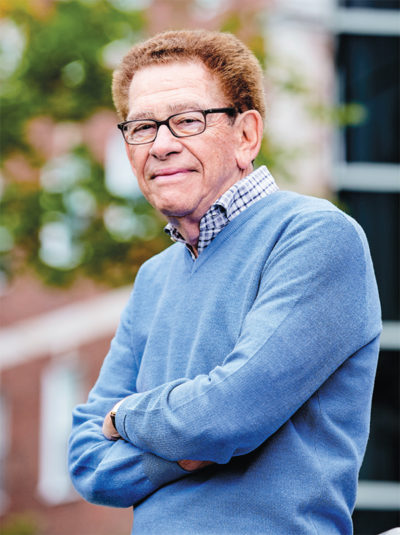
Senior Lecturer Ed Marram
Photo: Michael Quiet
Ed Marram isn’t just interested in helping students become successful entrepreneurs. He wants them to make a difference in the world.
After a successful scientific career that led him to found and grow his own business, Marram, a senior lecturer in entrepreneurship, made time to study under Professors Neal Churchill and Bill Bygrave at Babson until he felt ready to teach. He has been a faculty member in the Entrepreneurial program for more than 30 years, starting as an adjunct lecturer, then joining the full-time faculty after he sold his business in 2005.
Marram teaches Managing Growing Businesses, a graduate-level course designed to provide insight into the challenges and opportunities of growing an entrepreneurial company, and a number of executive education courses. He has taught students from all around the world, both at Babson and in their home countries. Some of those relationships have become long-term commitments. For example, Ulster University in Northern Ireland, started coming to Babson about 12 years ago to learn about entrepreneurship. Last year, Ulster awarded Marram with an honorary doctorate.
“I’m surprised by how much knowledge and interest my students have,” Marram says. “All of them want to be entrepreneurs—and all want to know how to better run a business.” But his students’ focus isn’t just on the bottom line, he notes. Many are creating socially responsible businesses. “It’s not just about making money,” he says. “It’s about doing good for people and the environment.”
For example, one of Marram’s students provides microloans to poor women in Mexico. “A small loan doesn’t change their socioeconomic status, but it does make a huge difference in their individual lives,” Marram says.
Marram brings a wealth of entrepreneurial knowledge to Babson. He owned Geo-Centers Inc., a high-technology, professional services firm, for more than 35 years, growing the business to a staff of 1,400 people and $200 million in revenue. The firm was recognized twice by Inc. magazine as one of the fastest-growing, privately held companies in the United States. That background, he notes, brings “broad, real-life experience—and real-life problems—to the classroom.”
Beyond his work at Babson, Marram has served on the boards of several privately held companies and at institutions of higher education. He is a member of the National Association of Corporate Directors, and he previously served on the Health and Educational Financial Authority of Massachusetts.
Marram speaks with pride about the learning experience at Babson. “The unique thing about (the College) is that it has practitioners like me teaching entrepreneurship,” he says. “What better enrichment can you have than people who have actually experienced and survived the issues companies face?” – Amy Davis
]]>The professor known as ‘Dr. Failure’ leads a bustling, global life
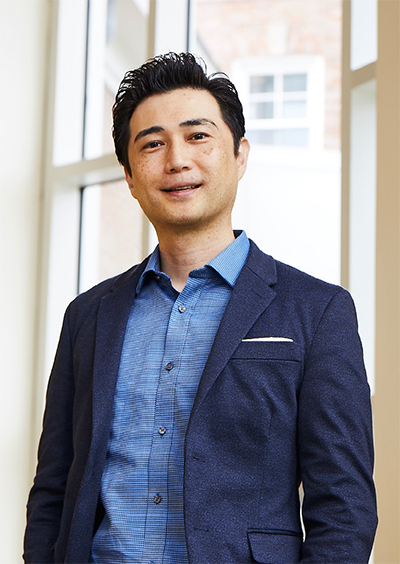
Yasuhiro Yamakawa
Photo: Pat Piasecki
To see Yasuhiro Yamakawa’s online calendar is a bit astonishing. Block after block of time is filled. When others see it, they ask when he has time to eat lunch or dinner.
“We always teach our students to be in action, to learn while doing. I’m just practicing what I’m teaching,” says the associate professor of entrepreneurship, who’s affectionately known as “Dr. Failure” for teaching students to welcome the setbacks that inevitably come in entrepreneurship and business.
Yamakawa has much to keep himself busy. Beyond his work at Babson, he is involved in 16 U.S. and international businesses as an investor, advisor, or board member. Based in Boston, he travels regularly, and he even makes time for a lunchtime ice hockey game three days a week. “I like to be in motion all the time,” he says.
One place Yamakawa frequents is Japan. He was born there, though he moved frequently as a child and continued the wayfaring life as an adult. In all, he has lived in eight countries. “Whenever there was an opportunity for me to jump on something, I moved,” he says.
Once he finally landed at Babson, however, he stopped. He has been at the College for 10 years. He finds it inspiring, and he enjoys interacting with his action-oriented students. “This is the longest I’ve ever stayed in one place,” he says. “I have a good reason. I just love Babson.”
In Japan, Yamakawa leads undergraduate and MBA elective abroad courses. He also is the executive director of Venture Café Tokyo, which hosts a weekly gathering of entrepreneurs, intrapreneurs, investors, educators, and students.
Yamakawa speaks regularly to colleges and companies in Japan. Failure is a frequent topic, which can make businesspeople uncomfortable. “Everyone goes silent,” he says. “Everyone starts looking down.”
Many in Japan see failure as source of embarrassment. So Yamakawa’s message, that failure should be embraced for the many important insights it can offer, is a startling one to Japanese audiences. “It’s all about failing, learning, pivoting, and finding the most successful pathway,” he says.
Yamakawa knows that changing an entire country’s culture is not easy, but when he finishes his talks on failure in Japan, he often receives a standing ovation. – John Crawford
When the Lab Meets the Classroom
David Blodgett integrates his diabetes research into his classes in multiple ways
David Blodgett doesn’t remember anything from his Type 1 diabetes diagnosis just before his third birthday, but that milestone has shaped some of his life’s work in indelible ways.
Blodgett, an assistant professor of biology who joined Babson’s faculty in 2012, also is a diabetes researcher at the University of Massachusetts Medical School, focusing on beta cell gene expression patterns. He and his colleagues examine differences and changes in hormone-producing human pancreatic islet cells, which come from donors who had Type 1 or Type 2 diabetes, were prediabetic, or didn’t have diabetes. Observing those characteristics may be the key to understanding how the diseases develop, and how to treat them.
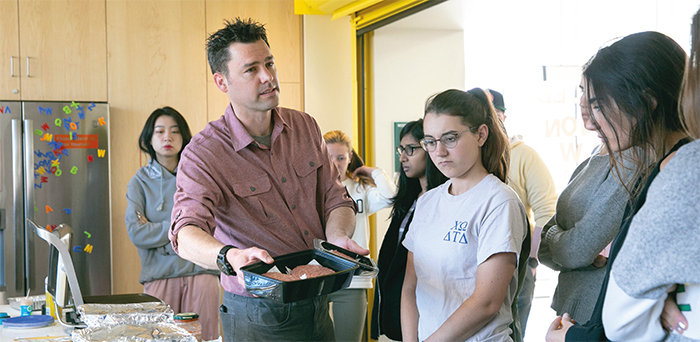
David Blodgett
Photo: Paige Brown
His academic sweet spot is at the intersection of teaching and research, where he can include some of the processes and findings of his research in classes on human biotechnology and sustainable food systems. “For human biotechnology,” he says, “if we’re talking about reprogramming stem cells to become beta cells, that ties back to genetic engineering and personalized medicine.”
Case Studies in Sustainable Food Systems examines the pathways food takes from farm to table, and includes topics such as food security, technology, GMOs, conventional versus organic farming, food waste, and agriculture and climate change.
In this class, Blodgett highlights his thought processes and the systematic ways of doing research to analyze a situation. “For example, plants that are grown in soil—how is that soil treated, and what are the consequences of those treatments? What conclusions can you reach, which ones can’t you reach, and what additional data do you need? These are the same things I ask myself in my research.”
Blodgett likes having two worlds to work from. “I’m lucky enough to have those two perspectives,” he says, “and I think that makes me a better teacher and a better researcher.” – Jeannine Stein
]]>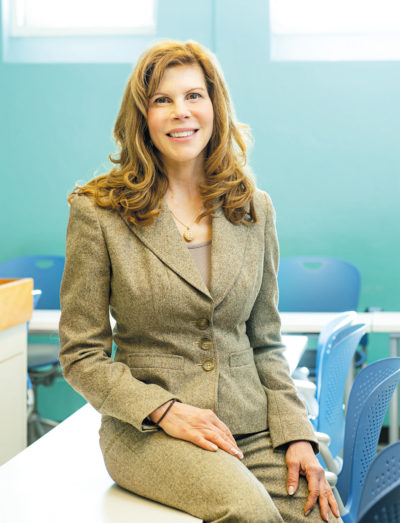
“A student will say, ‘Thank you, I’m seeing things so differently.’” – Mary Godwyn
Photo: Webb Chappell
From the state of business to the condition of the planet, the world can seem filled with inequality, intolerance, and inaction. But, Mary Godwyn, a sociology professor in the History and Society Division, remains an optimist.
In doing copious research for numerous journal articles and books in such areas as diversity, gender inequality, the environment, and business ethics, Godwyn has discovered encouraging progress being made. She’s all too happy to share it with her students.
Examining alternative ecological communities for a book she’s coauthoring gave her substantial material for her Nature and the Environment foundation course. “The first time I taught this three years ago,” Godwyn says, “it was a wonderful experience, but the environmental outlook was really discouraging. I had so little in the way of realistic and attainable solutions to offer students.”
She began researching alternative eco-communities that specifically address contemporary environmental crises and found bright spots in transition towns, communities that use grassroots efforts to reduce reliance on fossil fuels and become locally sustainable. “In many of the towns I studied,” she says, “people were renewing cooperative ties with their neighbors and committing to ethical treatment of their shared environment.”
In examining corporation case studies, Godwyn discovered most of the research focused on male business owners and decision makers and on large corporations run by well-educated white Americans. “And yet what we rely on in this country in terms of business capital,” she says, “are small businesses, and minority women and entrepreneurs are a fast-growing population of business owners.”
Revealing this evidence may rock the ground under some of her students’ feet, but that’s OK. “This disrupts the rules and images they have about who owns a business, who counts, who contributes, and what’s important to include in a business plan,” Godwyn says. She wants them to think about how business creation can reflect personal identity and community values and beliefs.
Shaking young people up has its rewards, she adds. “A student will say, ‘Thank you, I’m seeing things so differently.’ There’s a relief that they can chart a path that reflects a holistic approach to business they can really own and feel good about.” – Jeannine Stein
]]>An associate professor of entrepreneurship, Kim gives credit to his parents for inspiring his career, though they never launched businesses themselves. They immigrated to the United States from South Korea in the late 1960s, settling in the Chicago area, where Kim was born a few years later. “They came to the U.S. to look for economic security and opportunity,” Kim says. “I respect the pioneering approach to life that went with that.” Moving to a new country involves an entrepreneurial attitude, he says, including a curiosity and openness to new people, places, and ideas.
That curiosity continues to motivate him, and he hopes to cultivate it in his students. After coming to Babson in 2014, Kim designed an elective course that takes MBA students to Sweden for an intense week focused on technology, entrepreneurship, and design. Despite having a population of just 10 million people, Sweden has launched a host of iconic companies, including IKEA, clothing retailer H&M, Volvo, Spotify, and 142-year-old electronics and technology company Ericsson. The capital, Stockholm, also is home to a “thriving startup ecosystem,” Kim says.
During the trip, his students visit several companies and collaborate with Swedish business students on a design challenge. Kim says they also get the opportunity to observe an economy with higher taxes and a more robust social-welfare system than is found in the U.S. “It’s a different environment that I love my students to learn about, so they come back with a sense of what it’s like to be an entrepreneur in different parts of the world.”
The place of business in society is particularly interesting to Kim, who earned a doctorate in sociology from the University of North Carolina. He saw business as a field where he could combine his varied academic interests, including the topics of creativity and creation (the process of “making something of value from nothing,” Kim says) and the wide-ranging impact that relationships between people and organizations can have on the entrepreneurial process. Successful entrepreneurs, he says, are skilled at convincing other stakeholders to support their cause.
“As a sociologist, I think more broadly about the purpose of entrepreneurship in society,” he says. “Social scientists, and sociologists in particular, care about questions of inequality and justice.” Business owners obviously need their ventures to be profitable, but, says Kim, “I also believe that entrepreneurship should be about serving society as well. That makes this exciting to study as well as teach. How can you create wealth, but do it in a way that serves society and humankind at the same time?”
He spent eight years on the faculty of the Wisconsin School of Business at the University of Wisconsin–Madison before coming to Babson, a logical academic home for him because of its entrepreneurial focus. He likes that Babson prepares its students to apply startup thinking to a range of settings, including established companies, educational institutions, and nonprofits. “I also really like the overall mission of our college, to help our students become leaders who know how to generate value both economically and socially,” Kim says.
In addition to the Sweden course, Kim teaches the introductory entrepreneurship course for MBA students, “Entrepreneurship and Opportunity,” and serves as the faculty director of the Blended Learning MBA program, in which students learn through a combination of online and face-to-face courses.
Kim’s research touches on a range of entrepreneurial topics. He recently examined technology licensing agreements used to commercialize university inventions. He’s also interested in what factors give new companies staying power. “How are businesses able to survive, thrive, and scale so that they will be able to last for a longer period of time?” asks Kim. In one study, he showed that companies based around the founder’s leisure interests or hobbies tend to be established more slowly than other startups but are more likely to be profitable long term. Kim theorizes that the personal experience makes owners better able to understand their customers, products, and services. They’re also more likely to enjoy the work and be less discouraged by hurdles, he says.
When he’s not on campus, Kim spends much of his own leisure time cheering on his three daughters, ages 15, 11, and 8, at their sporting events and other activities. He loves traveling with his family; he and his wife and daughters recently visited the Baja California area of Mexico.
Moving to Boston in 2014 didn’t alter his behavior as a baseball fan; he remains loyal to the Chicago Cubs, his hometown team. He watches the scores online and tries to see a game in person at least once a year.
Relationships and connections are more than an academic interest for Kim. “I try to stay in touch with as many of my colleagues and former students as I can,” he says. “That’s one of the best parts of my job: getting to meet so many different people from different backgrounds and different parts of the world.”
And he enjoys introducing his many contacts to one another for jobs or advice or friendship. “I’m like the Velcro that brings together different parts of my network,” says Kim. “I try to do that as much as I can.”
]]>But while such a prospect concerns her, she believes that facts, not polemics, will ultimately win the day. “People have to come to these conclusions on their own. I tell my students, ‘I’m giving you the data. You can make your own decisions,’” she says.
From a young age, nature was a passion for Carey. As a child, living outside Rochester, N.Y., she was always drawn to water. “I grew up in the Great Lakes area, and my family sailed. I was skipper of my own sailboat by the time I was 8,” she says.
The future biogeochemist also had an intuitive, almost prescient grasp of her someday career. “When I was 4 or 5, I remember sitting in the back of my mom’s car and seeing pavement being laid somewhere. And I said, ‘Mom, they’re suffocating the earth,’” she recalls. “Now I study soil respiration. I study how soils breathe—how oxygen is taken up by microbes, and how soil microbes release carbon dioxide.”
Carey earned her B.S. in environmental policy and planning at Virginia Tech. She intended to pursue a career in low-impact development, which involves creating systems for runoff that mimic the natural processes of water flow, protecting water quality and aquatic habitats. “And as I studied that,” Carey says, “I started getting more interested in the science and the biogeochemistry behind water quality.” She went straight from college into a master’s degree program in environmental science at Yale’s School of Forestry & Environmental Studies.
She envisioned herself one day running an environmentally focused nonprofit, but at some point, the allure of field work and research took over. She worked for a professor who sent her out to collect samples of river water, and that led Carey to pursue classes in hydrology. Not everyone dreams of standing hip deep in a cold river, filtering water samples, but for Carey, the work was a fit. “I love to push myself physically, and it was fun,” she says, cheerfully recalling a day so cold her samples froze in the syringe.
After Yale, she took a job with the Massachusetts Department of Fish and Game, doing river restoration. “We really responded to constituent concerns,” she says, fielding calls about streams running dry or fish populations disappearing. Carey and her colleagues would investigate the causes behind the concerns. “My knowledge of river hydrology and rivers was solidified there,” she says. “It was a perfect job.”
Carey was on a bus headed to New York, reading a paper about stream flow in a peer-reviewed journal, when she had the thought, “I want to write a paper like this; I want to do this level of science.” Knowing such work would require a Ph.D., she returned to school—this time to Boston University—and earned a doctorate in earth science. Later, she held postdoc positions with the EPA in Rhode Island and at the Marine Biological Laboratory in Woods Hole on Cape Cod before joining the Babson faculty full time in January 2017.
Much of Carey’s research focuses on silicon, an abundant element found on land and in water; she looks at how human activities are altering the amount of silicon that reaches the ocean, which in turn impacts microscopic ocean plants and carbon dioxide levels. In some cases, human activity has decreased levels of silicon, and in others it has increased those levels. Both have significance. “When we’re modeling future climate scenarios, it’s really important to understand the drivers of carbon dioxide, because they’re shifting,” says Carey. It’s serious science that has sent her to Alaska several times to study the mechanisms driving silicon export and the ways in which human activities and climate change alter the flux of silicon to oceans.
Working at Babson might seem a curious choice for someone with Carey’s interests. But she says taking the job was “a no-brainer.” “I love the environment here. My colleagues are so friendly, and while we are dedicated researchers, I like how our focus is also on the students’ Babson experience, rather than solely on our own research endeavors,” she says. “The students are very smart. They ask good questions. And I knew that if I was going to be teaching at a small school, I wanted to teach at a good school.”
In the course she teaches, “Oceanography,” Carey covers the physical, biological, and chemical processes at work in our oceans. While the objective of the course is to impart a basic scientific understanding of these processes, she also addresses such topics as pollution, fisheries management, and renewable energy.
Carey believes that teaching future business leaders might have an even greater impact than teaching future environmentalists who have already, as she puts it, “drunk the Kool-Aid.” “I try to take students out of their business bubble and make them amazed at the natural world. I feel like there’s an avenue for them doing positive things related to the ocean, as entrepreneurs. There are problems the market could maybe fix,” she says. If her students don’t specifically pursue environmental entrepreneurship, she hopes they’ll at least consider their own environmental impact and how natural systems work. “I try to foster their curiosity,” she says.
And she lets the facts speak for themselves. “When I teach climate change, we look at CO2 levels over time,” she says. “We look at a graph showing where we are now and what’s happened over the last 800,000 years. And that graph is just—well, I don’t need to say anything more.”
]]>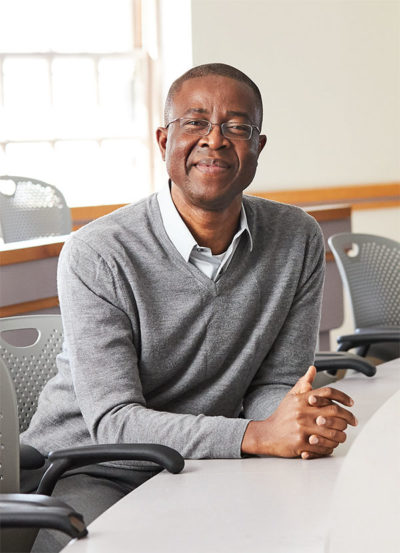
Photo: Pat Piasecki
Vincent Onyemah, associate professor of marketing
Vincent “Vini” Onyemah, associate professor of marketing, was born in Ibadan, Nigeria, and is a member of the Igbo tribe. People in his tribe, he says, believe that their destinies are under their own control. “We are always trying new things,” he says.
In the tradition of his tribe, Onyemah’s personal philosophy is to live life outside of his comfort zone. “Strength comes through misfits,” he says. Not the socially maladjusted kind, but the type of “misfit” in which something seems out of place or illogical. “From the time I was born, my life has been a series of misfits,” Onyemah says. For instance, he was born on the wrong side of the bloodiest civil war in his country’s history—“It was Nigeria against my tribe”—and his family had to go into hiding for several years. Then in elementary school, Onyemah attended a Catholic school in a Muslim neighborhood.
But these challenges have made a huge difference in Onyemah’s life. “You learn about yourself, how to humble yourself,” he says. “You think you know something, but then you meet people, go places, and you say, ‘hey, no.’ It’s helped me to never take anything for granted. It taught me the value of trying to ask the right questions, and to realize that you don’t know what you don’t know.”
Onyemah would feel like a misfit many more times in life. A star soccer player in high school, he wanted to try to become a professional. Onyemah also loved business, which he learned about from working with his mother and father. His mother had a stall in the local market where she sold spices and dried fish. From her, Onyemah learned the art of interacting with people. His father, a secretary in the College of Medicine at the University of Ibadan, was an entrepreneur on the side, selling cleaning supplies. Onyemah would join him on trips to negotiate contracts and then help source and sell the supplies.
But Onyemah didn’t become a professional soccer player or go to college for business. His father, inspired by his co-workers at the College of Medicine, wanted one of his seven children to be a doctor. After winning one of eight full scholarships to college in a national competition, Onyemah seemed the likely candidate. “But I’m scared of the sight of blood,” he says. “I suffer more than the patient just looking at it.” So he bargained with his father. “I told him, I don’t think I would be able to study medicine. But I love math. Ask your friends at the university which subjects have more math, and that’s what I’ll study.” His father came back to Onyemah with an answer: civil engineering.
Although he didn’t enjoy his studies, Onyemah excelled. For a year after graduating, he worked as a civil engineer to complete his required service to his country. Then he had an opportunity to earn a PhD in engineering with a full scholarship to King’s College London. Instead, he decided to follow his passion and study business at the IESE Business School in Barcelona, Spain, receiving a scholarship from a foundation. Onyemah chose IESE because this time he actually wanted to be a misfit. “People would say, ‘You’re crazy, going to Spain,’” he says, because he didn’t know the language or culture. “And I’d say, ‘Yes, I know.’” But he thrived, and he came away with both a degree and fluency in Spanish. Onyemah chose a similar path when earning his PhD. “I wanted to go out of my comfort zone again,” he says, so he went to study at Insead in Fontainebleau, France, earning his degree and becoming fluent in French.
When looking for a teaching position, Onyemah chose Boston for the reputation of its universities and its location. “I had in my mind that I was going to travel, and Boston is not too far from the rest of the the world,” he says. Although he was intrigued by Babson, no positions were open, so he accepted a position at Boston University. About six years later in 2009, he learned of an opening at Babson, applied, and joined the faculty that fall. The smaller, entrepreneurial school fits Onyemah’s personality. “You’re not afraid to think differently, to get out of your comfort zone and make something happen,” he says.
One course that Onyemah helped create is “Sales in Action,” which teaches students how to be persuasive and communicate their value. The course focuses on sales, but the skills it teaches apply to many aspects of life. “When you make a request of any nature, that is selling,” he says. “In today’s world, there’s hardly anything you can do if you don’t have the ability to present a compelling case.”
As a professor, Onyemah continues to push himself out of his comfort zone. Last academic year, he took a sabbatical and moved with his family to Mexico City. Friends and family once again questioned his choice, but his wife and three children were thrilled with the experience. “Now they speak Spanish, they made new friends, and they see Mexico for what it really is,” he says. In Mexico City, Onyemah did research on sales-force management and practices in Latin America, continued work he was doing with the Babson Entrepreneurship Ecosystem Platform, co-authored an article for the Harvard Business Review, and finished the book he co-authored, Entrepreneurial Selling.
Onyemah never plans to stop being a misfit. Over the course of his career, which also includes working with the International Finance Corp. and consulting, he has lived in five countries for at least a year and has been to more than 20. “Now I go to many parts of the world, where people think I’m a misfit, and I’m still able to serve and make an impact and relate with the people,” he says. “It’s helped me to never take anything for granted.”
]]>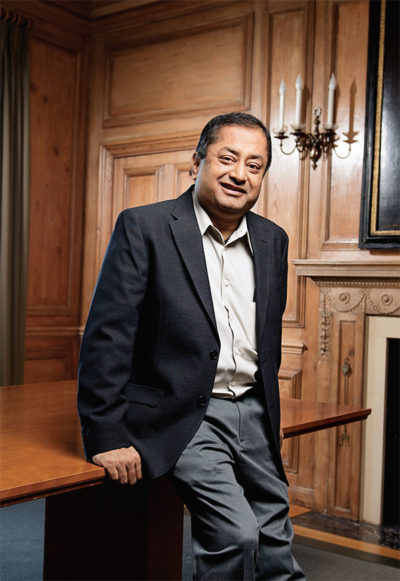
Photo: Webb Chappell
Besides his work as dean of faculty, professor Bala Iyer has had a longtime interest in information systems and strategy. “I love reading about it. I love researching about it. I love teaching about it,” he says.
When Bala Iyer decided to come to Babson in 2006, he was thinking of his daughter.
For 12 years, he had been teaching at Boston University, but a position at Babson offered the Wellesley resident a priceless benefit: It was closer to home. That meant he would have more time to spend with his daughter, Varsha, who was then in elementary school. In particular, working near home would enable him to drive her to school.
“When you want to know what’s really going on with your children, give them rides to and from school,” says the professor of information technology management. At home, Varsha typically rushed off to play, but in the car she had no distractions. She and Iyer talked and shared time together, ride after ride, year after year. “Almost every day, I would take her to and from school,” Iyer says. “That was precious to me. Time with children is fleeting.” Varsha now attends Dartmouth College, and Iyer says committing to drive her all those years was “one of the best decisions I’ve made.”
Of course, that decision also led to a rewarding career at Babson. Last year, Iyer was named the College’s new dean of faculty, making him responsible for faculty recruitment and development. “I take this as a very high honor to do this particular job,” Iyer says. “Faculty are our most treasured resource.” Among his responsibilities, he focuses on maintaining the high quality of faculty members and encouraging research that aligns with the school’s mission. He also addresses diversity and aspires to have the makeup of the faculty match that of the student population. “It is a fantastic student body,” Iyer says. “The students want the faculty to be representative of who they are.”
Iyer was nominated for the job of dean by many of his colleagues. Previously, he was chair of Babson’s Technology, Operations, and Information Management Division, where Iyer employed a collaborative leadership style. He and the division’s faculty worked closely together to give TOIM’s course offerings a much-needed revamp. “I don’t have a hierarchical style of management,” he says. “The faculty are my peers.”
When describing his role at Babson, Iyer is apt to reference the leadership style of someone far removed from academia or business: football coach Bill Belichick. Iyer is a fan of football, and of Belichick especially. He likes the coach’s system, which emphasizes the team over the individual. “It doesn’t matter who the player is,” Iyer says. “It is always about the team. It’s never about you.”
While the TOIM chair was the first leadership position Iyer has held, he has long been intrigued by the idea of managing people. Iyer grew up in Chennai (formerly known as Madras), a large, bustling city in southern India. Every evening, his family had a “debrief,” as Iyer calls it, during which they talked about their days. Iyer’s father was a manager for a government department. “He would talk about his everyday decision making,” Iyer says. “He got me interested in management. He planted the seeds way back then, when I was in my teens.” As for Iyer, he enjoyed educating his parents about various topics during these daily debriefs. “I liked explaining things. I would go on and on. They were a captive audience,” he says. “I’m sure they knew that somewhere in my future was education.”
Iyer earned a bachelor’s degree in engineering from Anna University in Chennai, and, intent on a career in higher education, he went to Louisiana State University in 1986 for a master’s degree in industrial engineering. “I was determined to be an educator,” he says.
At LSU, Iyer picked up his interest in football. Working as a math tutor for the school’s football team, he was amazed that these physically imposing athletes could be so intimidated by math problems yet excel at such a brutally challenging sport. Making small talk with players, he asked them about the rules of football and attended games. He gained an appreciation for the sport and what it can teach about success in business and life. “I have never played it, but I can identify with it,” he says. “Football is strategy for me. It’s hard work. If you want success, you’ve got to be prepared.”
Iyer next earned a Ph.D. in information systems from New York University. He immediately took to the city, with its art scene and amazing restaurants and crowds, which reminded him of the energy and clamor of his old hometown of Chennai. His love of football also continued, and he became a fan of the New York Giants. When former Giants coach Bill Parcells came north to the New England Patriots in 1993, Iyer switched loyalties to a team that still has his heart today. Iyer owns DVDs of all the Patriots’ Super Bowl victories, and as he watches them together with Varsha and his wife, Priya, Iyer offers running commentary about the players.
After graduating from NYU in 1994, Iyer went on to teach at Boston University and then Babson. While he has settled into his role as dean, Iyer remains committed to teaching and research. He has had a longtime interest in information systems and strategy, and these days he’s particularly focused on the business strategies of digital giants such as Google and Facebook. For decades, he says, the auto industry of the early 20th century served as the main model for doing business, and lessons from the industry were taught in business school. That’s changing. “The way to learn now is to look at the digital companies,” he says. “The way they run their companies is the way we’ll run our companies, regardless of industry.”
Teaching, research, and his responsibilities as dean keep Iyer’s days at Babson full but fulfilling. “I dance into work every day,” he says, “because there’s nothing else I’d rather do.”
]]>So Kokina asked her parents for a tutor. Eventually, she studied English in school as well. “But for a couple of summers, all I remember is me and my English tapes and listening to the BBC radio a lot,” she says.
Coming from a family of educators, Kokina grew up in an atmosphere where curiosity and learning were encouraged. Her father was a teacher and then principal at a vocational school. “My favorite memory from childhood is my father taking me to his class, and it was all boys,” she says. “I really felt special when I was the little kid sitting at his desk, and he was showing me around.”
Her sister, who is 14 years older, was actually her teacher one year in elementary school. Her mother, an economist, instilled in Kokina a passion for math. A desire to learn about new cultures brought Kokina to El Paso, Texas, on a Rotary exchange program for her senior year. Even the parents of her U.S. “family” were educators. “Education has shaped my life in a big way,” she says.
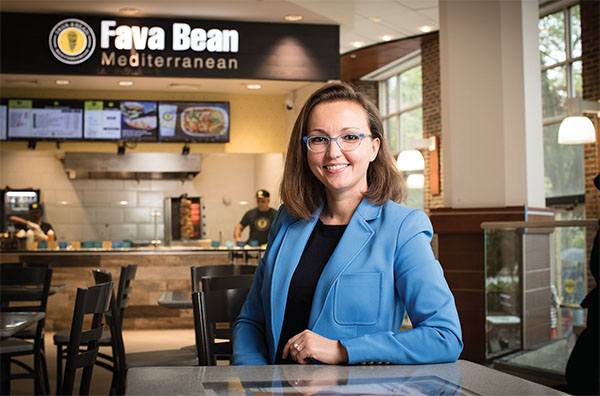
Photo: Tom Kates
Julia Kokina, assistant professor of accounting, at Fava Bean Mediterranean, the restaurant she co-founded with her husband.
Entrepreneurship also intrigued Kokina from an early age. In Latvia, she saw her country gain independence from the Soviet Union in the early 1990s. Afterward, many people started businesses, and Kokina saw how those ventures positively affected their lives. Later, as a student in El Paso, she noted how entrepreneurship and small businesses helped shape the communities on the border of the U.S. and Mexico.
“I saw how entrepreneurship can change lives,” she says, which prompted her interest in studying business and accounting. But instead of heading back to Latvia for college, Kokina, who liked her independence and wanted to continue exploring new cultures, decided to study at the University of Texas at El Paso (UTEP).
Her sophomore year turned out to be pivotal. Juarez, Mexico, which borders El Paso, was dubbed the violence capital of the world that year, Kokina says. She and fellow students staged events for V-Day, the global movement aimed at ending violence against women. “We were staging protests on the border and raising money for shelters,” she says. “I continued that kind of work throughout college.” Kokina also founded a Rotaract club on campus and met her future husband. “It was probably the most monumental year of my life,” she says.
Working with shelters, Kokina found herself thinking entrepreneurially about how to raise money for them. She set up huge garage sales, receiving items from the entire Rotary community in El Paso, and donated the proceeds to shelters. She also started a greeting card project, asking children at a shelter to draw cards, finding a volunteer designer to help create the cards, and then printing and selling them. Again, all proceeds went to the shelter.
Upon finishing her undergraduate degree, Kokina decided to continue her education at UTEP, earning a master’s and becoming a CPA. While studying, she took a job as a tax accountant and then senior auditor, for which she helped train employees. Something clicked. “That’s when I realized I enjoy teaching,” she says, and so she decided to stay even longer at the university and earn a PhD in international business.
In 2014, nine years after arriving in the U.S., Kokina finished her studies and had seven job offers. She chose Babson because of its focus on entrepreneurship. Now as a member of the accounting division, conducting research and teaching courses in an entrepreneurial environment, Kokina has a job that encompasses all of her passions.
Kokina researches innovations and emerging technology in accounting, so she explores such topics as analytics, artificial intelligence, and blockchain technology. “You have to follow up on what the industry is doing,” she says. “You’re not just preparing students to pass an exam. You’re preparing them for when they walk into a company and are expected to know these technologies and recognize opportunities for them.”
This fall, her classes include “Accounting Analytics,” which she helped develop for the MS in Accounting. The course examines such topics as how a company would use analytics to evaluate its performance. “That might involve figuring out which metrics determine your performance, and how you would develop systems of measuring financial and non-financial performance,” she says.
The entrepreneurial spirit still lives within Kokina as well. In June 2016, she and her husband opened Fava Bean Mediterranean, a fast-food restaurant in Cambridge, Massachusetts, that focuses on cuisine from the Middle East, including Yemen, the homeland of her husband’s family. “My husband’s family is in the restaurant business,” Kokina says, “and he has always had a dream of being his own boss. My involvement has been research, development, financial analysis, strategic thinking, and constant support.”
Kokina shares what she learns from the business with her classes, and sometimes she seeks advice from her students. “I might ask them, what do you think about Snapchat? Will this work with your population?” she says.
Being a professor is exciting, says Kokina. “The opportunity to learn,” she says, “and to keep up with what’s going on—it’s fulfilling and motivating.”
]]>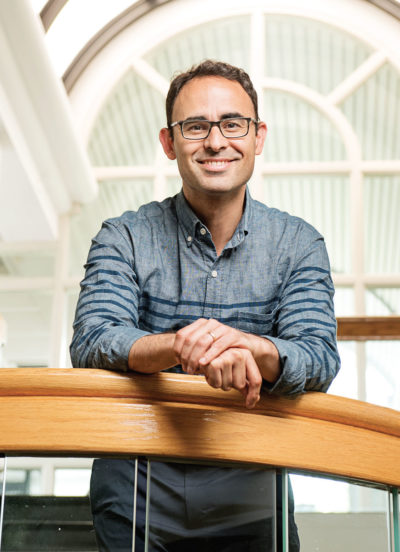
Photo: Webb Chappell
Sinan Erzurumlu
Erzurumlu simply prefers to live with no boundaries. “I’ve always seen myself as a world citizen,” he says. “We’re all people. We should chase ideas and cultures and live in places where we feel the most comfortable. I choose to be open minded. I think that pushed me in what I want to do in life and my journey to a Ph.D., which I had no intention of doing. It happened because I chased an idea and realized it was great.”
Now an associate professor of operations management, Erzurumlu initially thought he would become an engineer. In Turkey, all students take an exam before college: The better they perform, the more likely they can attend their school of choice. Out of 1.5 million students, Erzurumlu was ranked 63rd, a feat he describes with both pride and modesty, saying he did so well because he worked hard to prepare for the exam. (Perhaps, but the 1,499,937 other students might have studied as well.)
With such a score, Erzurumlu could go to any school in the country and study whatever intrigued him. Having performed in plays throughout high school, he considered drama, as well as business and economics. But in the end, he followed a passion for math and science and earned his undergraduate degree in engineering from Bogazici University in Istanbul. To balance his studies, he continued to act and played in bands throughout college. “I strongly believe that everybody should have at least two interests,” he says, “maybe a profession and something on the side. Because it works your brain very differently.”
In 1999 after graduating from college, he decided to come to the U.S. and earn a master’s in engineering at the University of Texas at Austin. A sense of adventure, a desire to study operations research and decision making, and a girlfriend on her way to Texas (being an exchange student, she didn’t stay for long) influenced his choice of schools. “My intention was to come here, get a degree, and then go back to Turkey in maybe two years,” he says.
But Erzurumlu kept discovering new areas of interest. He found himself drawn to research papers from the business school about topics such as supply chain management. Upon completing his master’s, Erzurumlu came to the conclusion that he liked the scientific methods and rigor of engineering but preferred applying what he learned to the business world. So he decided to stay and earn his Ph.D. in supply chain and operations management.
Unsure whether he wanted to stay in academia or enter the corporate world, he took a yearlong consultancy gig at Dell while working on his degree. “All this schooling was great, but I wanted to go out there and see how people are working,” he says. His charge included analyzing Dell’s post-sales, customer-service model. “I realized that it’s good fun,” he says of working with Dell, but he wanted the freedom of choosing what to study that comes with being a professor. “You’re like an entrepreneur of ideas as a faculty member,” he says. “You come up with an idea. You hope that it’s worthwhile. You check with people, if they’re going to like the idea, and then you start raising it and solve it and tell people about the solution. I really like that aspect of being a professor.”
Erzurumlu also enjoys being in front of people and connecting with them on a social level, so coming to Babson, where research and teaching are equally valued, was an ideal opportunity. In 2007, he joined the Technology, Operations, and Information Management Division and teaches undergraduate and graduate students. Erzurumlu’s research spans a range of topics, including how operational efficiencies can stimulate growth, as well as strategies for social innovation and sustainability. Caring for the environment long has been important to Erzurumlu, who talks about an aptitude test he took as a youth that suggested he become a forest engineer. “I laughed at it,” he says, “but that test was pretty good, showing my connection with nature and caring about why we are not living within our means and always chasing growth.”
So Erzurumlu incorporates sustainability issues into his courses, and he developed and teaches “Leading and Managing Sustainability,” which examines the issue from an operational but also a personal level. “I include a discussion about consciousness and values, even as a manager. How much profit is good profit? How much growth is good growth?” he says.
Erzurumlu recently completed a case study with Preserve, which manufactures 100 percent recycled household products. Eric Hudson, MBA’92, founder and CEO of Preserve, asked himself similar questions. “Eric could have easily grown his company much faster,” says Erzurumlu, “but that’s not exactly what he wanted to do. He asked himself what a company should exist for and what should be its true goals. It’s a good example of how he integrated his values into what he wants to do with his company.”
Getting to know his students, Erzurumlu sees a generation of soul searchers and believes sustainability speaks to them. They’re ambitious, he says, and want professions that are in line with their values. “They believe they can do more than make money with their business degrees,” he says. “I really respect the Babson students. This truly is an entrepreneurial place to learn, and even if you don’t come here saying you want to be an entrepreneur, it rubs off on you.”
]]>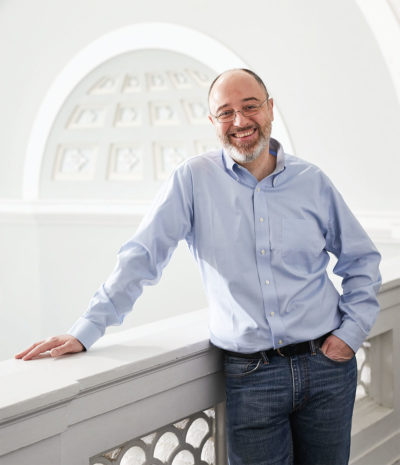
Photo: Pat Piasecki
Miguel Rivera-Santos
Miguel Rivera-Santos, associate professor of strategy and international business, has studied Dadaab. He says that outsiders shouldn’t make assumptions about life there. “We close our eyes and think it’s a wasteland,” he says. “That’s wrong. It’s not a wasteland.” Conditions in the camp are dusty and dire, but residents work hard to build an existence. They make things. They buy and sell. The entrepreneurial spirit thrives, albeit on the most practical of levels. “The business activity is not about becoming rich,” says Rivera-Santos, the Louis J. Lavigne Research Scholar. “It’s about feeding one’s family.”
Rivera-Santos’ research focuses on communities in poor and overlooked places such as Dadaab; specifically, he examines how interactions with governments and multinational companies can affect those in poverty. Rivera-Santos’ work has taken him to many African countries, including Cameroon, Tanzania, South Africa, and Botswana. Those travels have left him impressed by Africa’s burgeoning business climate (“It’s a continent that is waking up,” he says) and inspired by its culture, history, and beauty. He is amazed by how much he doesn’t know about the continent. “Africa has a rich culture that goes back many hundreds of years,” he says.
Much of Rivera-Santos’ life has been spent moving among different countries and cultures. He was born and raised in Paris, but his parents come from Galicia in northwestern Spain. That explains his Spanish last name. It also explains a hobby he once pursued: playing the bagpipes. Galicia is a Celtic region in Spain, and the sounds of a bagpipe band are common in his family’s village. “It’s not the Scottish bagpipes but Galician bagpipes,” he says. “I can play, but I’m not good at it. I haven’t played in years.”
In Paris, Rivera-Santos and his family lived near the Canal St. Martin, an area that was once working class with mom and pop shops but has grown more “posh” over time, he says. As a child, he enjoyed Paris, but he didn’t view it as a beautiful or romantic city. It was simply what he knew, the place where he lived and went to school. Nowadays, he sees the city differently. “Going back, I see the beauty of it that I didn’t see before,” he says. “Now I’m a tourist when I go back, which is great.”
As a young adult after college, Rivera-Santos lived in Poland for almost six years during the 1990s. At the time, France had compulsory military or civil service, and Rivera-Santos choose the latter. This service brought him to Poland, where he worked for the French embassy, and when his 18 months of service were done, he decided to stay. He enjoyed Poland and its people, and the 1990s were an exciting time to be there as the country found its way after the fall of the Berlin Wall. Rivera-Santos remembers seeing new businesses continually popping up. “Things were coming back to life,” he says. “I think there was a real entrepreneurial spirit.”
After completing his civil service, Rivera-Santos worked for a foundation that fostered cooperation between French and Polish universities. As part of that work, he found himself in the classroom, teaching basic business courses. He enjoyed it. In fact, Rivera-Santos recalls clearly the day he decided to make teaching a career. He was teaching an intro to marketing course in the city of Lublin in eastern Poland, an agricultural area, and his class was full of farmers who needed help learning how to sell. One day, a student came up to him and said that he had positioned the wares in his co-op’s store according to principles that Rivera-Santos had taught in his class. “After your class, I reshelved,” the student said, “and then we sold more.”
A Perfect Meal
I love Korean food. When people want to make me happy, they take me to a Korean restaurant. You have so many flavors. You feel like you’re at a banquet. And it’s spicy. I love spice.
A Beloved Movie
Tokyo Story by Yasujiro Ozu. Not much happens, but it grabs you. I have seen it about 15 times. Every one of my friends has seen it because it’s a requirement to be my friend.
A Favorite Place
Zanzibar. The culture is rich. The people are nice. The landscape is beautiful. It has everything you want in a place. And Freddie Mercury was born there.
A Favorite Place on Campus
I love Tomasso Hall. It’s my home. The coolest people on campus are here, but I may be biased.
Rivera-Santos was astonished. “I remember thinking, ‘I did something that had an impact,’” he says. “This guy got something out of that. It got him thinking.” In 1997, Rivera-Santos left Poland and went on to earn a doctorate in strategy from HEC Paris. He came to Babson for a job interview in 2002 and immediately was smitten by the school. “It felt like home,” he says. “I could picture myself in an office on campus.”
That was 15 years ago. At Babson, Rivera-Santos teaches courses on strategy and global business institutions and policies. He often brings examples from his travels into the classroom. When teaching about innovation in poor markets, for instance, he may discuss how cell phones changed grocery shopping in remote Tanzania or helped Cameroon entrepreneurs manage their fleet of trucks.
His research on poverty continues to bring him to Africa. One of his recent projects involved looking at how government policies have affected street vendors in Yaounde, the capital of Cameroon. The vendors sell all sorts of items, from flowers to hats to phone cases, on the city’s streets. Viewing the vendors as a nuisance, but also wanting to help them out of poverty, the government introduced regulations, requiring vendors to register and pay taxes and moving them to a central location.
The government hoped the policies would legitimize the vendors and free them from corruption and the constant jockeying for prime spots on the streets. But while some vendors thrived, others didn’t, their way of doing business upended by the new rules. “All of a sudden, they had to completely change their business model,” Rivera-Santos says.
By traveling to Africa, Rivera-Santos strives to shine a light on communities, such as the street vendors, that are poor and powerless. He makes sure to share his research, whether with governments hoping to help those communities or with corporations looking to break into a new market. “My hope,” he says, “is that I can help them make better decisions, even in complex settings.”
]]>